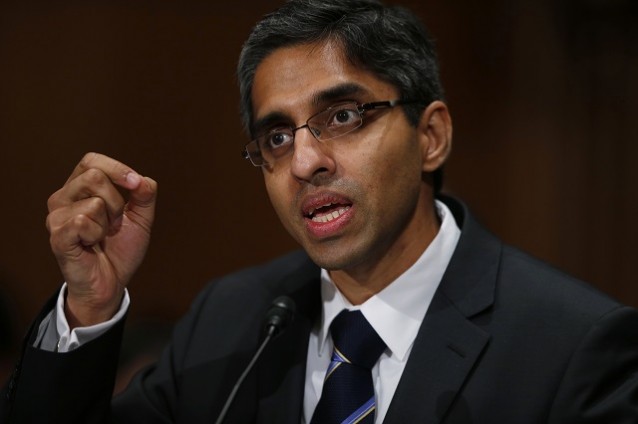President Barack Obama should have known Senate Democrats would balk at the confirmation of Dr. Vivek Murthy as the next surgeon general of the United States.
Murthy has been outspoken in his belief that gun violence is a public-health crisis, and the National Rifle Association, the big voice of the gun lobby, is afraid people might agree. Until the midterm elections are over, the White House has put Murthy on ice.
That’s fine for now, but the president had better not let this go. If he is to live up to his promise to do everything in his power to prevent another massacre of innocents, like the one in Sandy Hook Elementary School in 2012, Vivek Murthy‘s confirmation should be his administration’s top priority once the new Congress convenes in 2015.
The position of surgeon general holds virtually no policy-making power, yet the NRA lobbied hard to block his confirmation. Why? To answer that, let’s recall the broad outlines of the debate over gun violence. It has more or less two camps.
One is the camp of constitutional freedom. The other is the camp of commonsense. It is perfectly rational for a society to control the circulation of firearms to minimize the potential harm such firearms may inflict. But that cannot and will never compete with full-throated calls for individual liberty. Not in this political climate.
Gun deaths are poised to surpass automobile deaths soon. One analysis by Bloomberg News estimates that point to be within the next year.
Indeed, more guns do in fact lead to more death by gunfire, but it’s folly to believe Congress will restrict what the Supreme Court has ruled is an absolute right. The Democrats and other proponents of “gun control” can shake their heads in the disbelief that people can be so stupid, but that’s not going to get anything done. And the more they push for gun regulation, the more power they give the NRA, because the NRA draws its strength from the deep pool of fear that the government imperils liberty.
First, Democrats need to stop. Just stop it. Second, they need to reframe the debate. Not only that, they themselves need to correctly see the issue for what it really is: a public-health crisis. Gun deaths are poised to surpass automobile deaths soon. One analysis by Bloomberg News estimates that point to be within the next year.
So this isn’t about sacrificing liberty. This is about preserving life and liberty by way of protecting public health. This, and probably only this, can break the vicious cycle we are in. And that’s why Vivek Murthy’s Senate confirmation is so important.
Try naming a surgeon general. You probably can’t. That’s because the job of surgeon general doesn’t have much of a public profile. The exception, if you’re old enough, is likely to be C. Everett Koop, President Ronald Reagan’s pick. We remember him because he used the position of surgeon general as it should be used: as bully pulpit.
In an era when smoking cigarettes was a God-given right, Koop said they’d eventually kill you. In an era when AIDS was a disease homosexuals got, and therefore unworthy of our concern, Koop said no. If you have irresponsible sex, you can get it, too.
In other words, the surgeon general may have no power, but he can have enormous influence on Congress and on public opinion. He speaks volumes as the authoritative voice of the medical establishment on laws and policies effecting us all.
To be sure, there are many reasons why smoking is now banned in virtually every public space in every major American city, and there are indeed many reasons why AIDS is now entirely understood to be a disease indifferent to sexual orientation. But neither would be imaginable without the high-profile soapboxing of C. Everett Koop.
Vivek Murthy has the same potential. He’s impeccably credentialed. He practices medicine at the Harvard Medical School. He’s the president of Doctors for America, a 16,000-member advocacy group. And he has said, more or less, that the 300 million guns now in circulation are a public health hazard the government must address.
In attacking Murthy, the NRA may have tipped its hand. Surgeons general can do nothing but attempt to persuade us to embrace policies that are for our own good. If we had a surgeon general who told us that our love of guns, like our former love of tobacco, would eventually kill us, we might take steps toward a solution.
That must terrify the NRA. And that can be nothing but a good thing.
John Stoehr is managing editor of The Washington Spectator.





0 Comments